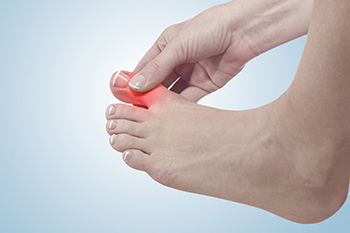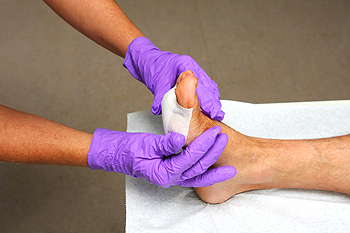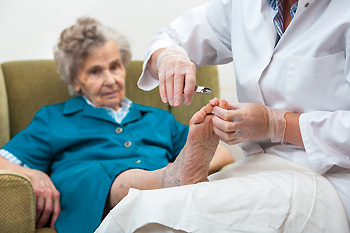
Sesamoiditis is the inflammation of the sesamoid bones, two small, pea-shaped bones located beneath the big toe joint. These bones play a key role in absorbing pressure, reducing friction, and helping the big toe move during activities like walking, running, or dancing. When they become inflamed, it can cause significant discomfort. This condition often affects those who put repetitive stress on the ball of their foot, such as dancers, runners, or athletes. It can also develop in individuals with high arches or frequent high heel wearers. The primary symptom is pain beneath the big toe, which typically intensifies with activity and eases with rest. To manage sesamoiditis, reducing pressure on the affected area is key. Wearing cushioned shoes or custom orthotics can help alleviate pain, while rest and anti-inflammatory medication can provide pain relief. If pain persists or worsens, seeking professional care is an important step. A podiatrist can offer an accurate diagnosis and tailored treatment plan. If you have this painful condition, it is suggested that you schedule an appointment to see a podiatrist for relief and treatment solutions.
Sesamoiditis is an unpleasant foot condition characterized by pain in the balls of the feet. If you think you’re struggling with sesamoiditis, contact one of our podiatrists of Central Ohio Comprehensive Foot Care. Our doctors will treat your condition thoroughly and effectively.
Sesamoiditis
Sesamoiditis is a condition of the foot that affects the ball of the foot. It is more common in younger people than it is in older people. It can also occur with people who have begun a new exercise program, since their bodies are adjusting to the new physical regimen. Pain may also be caused by the inflammation of tendons surrounding the bones. It is important to seek treatment in its early stages because if you ignore the pain, this condition can lead to more serious problems such as severe irritation and bone fractures.
Causes of Sesamoiditis
- Sudden increase in activity
- Increase in physically strenuous movement without a proper warm up or build up
- Foot structure: those who have smaller, bonier feet or those with a high arch may be more susceptible
Treatment for sesamoiditis is non-invasive and simple. Doctors may recommend a strict rest period where the patient forgoes most physical activity. This will help give the patient time to heal their feet through limited activity. For serious cases, it is best to speak with your doctor to determine a treatment option that will help your specific needs.
If you have any questions please feel free to contact one of our offices located in Delaware and Westerville, OH . We offer the newest diagnostic and treatment technologies for all your foot and ankle needs.

Foot wounds that do not heal properly are often a sign of underlying health issues that require medical attention. Poor circulation, commonly seen in conditions like diabetes or peripheral artery disease, can limit the flow of oxygen and nutrients necessary for healing. Infections can also delay recovery by causing ongoing inflammation and tissue damage. Other factors, such as repeated pressure, wearing improper footwear, or unrecognized trauma, can keep wounds from closing. Symptoms that indicate a wound is not healing include persistent redness, swelling, drainage, foul odor, or increasing pain. The appearance of black or dead tissue around the wound edges is another serious warning sign. If you have developed a foot wound that is not healing as it should, it is strongly suggested that you promptly contact a podiatrist who can diagnose the cause, and effectively treat cuts and wounds on the feet.
Wound care is an important part in dealing with diabetes. If you have diabetes and a foot wound or would like more information about wound care for diabetics, consult with one of our podiatrists from Central Ohio Comprehensive Foot Care. Our doctors will assess your condition and provide you with quality foot and ankle treatment.
What Is Wound Care?
Wound care is the practice of taking proper care of a wound. This can range from the smallest to the largest of wounds. While everyone can benefit from proper wound care, it is much more important for diabetics. Diabetics often suffer from poor blood circulation which causes wounds to heal much slower than they would in a non-diabetic.
What Is the Importance of Wound Care?
While it may not seem apparent with small ulcers on the foot, for diabetics, any size ulcer can become infected. Diabetics often also suffer from neuropathy, or nerve loss. This means they might not even feel when they have an ulcer on their foot. If the wound becomes severely infected, amputation may be necessary. Therefore, it is of the upmost importance to properly care for any and all foot wounds.
How to Care for Wounds
The best way to care for foot wounds is to prevent them. For diabetics, this means daily inspections of the feet for any signs of abnormalities or ulcers. It is also recommended to see a podiatrist several times a year for a foot inspection. If you do have an ulcer, run the wound under water to clear dirt from the wound; then apply antibiotic ointment to the wound and cover with a bandage. Bandages should be changed daily and keeping pressure off the wound is smart. It is advised to see a podiatrist, who can keep an eye on it.
If you have any questions, please feel free to contact one of our offices located in Delaware and Westerville, OH . We offer the newest diagnostic and treatment technologies for all your foot care needs.

Foot problems are common in seniors, especially those over 75, and often impact mobility, independence, and quality of life. With age, the skin becomes thinner, circulation may decline, and nails can become thick or hard to manage. Other conditions, such as bunions, can cause persistent pain and make wearing shoes uncomfortable. Many older adults also experience swollen feet, diabetic foot ulcers, gout, and foot pain linked to arthritis or obesity. Many of these conditions are worsened by years of wearing poorly fitted shoes or underlying health issues like diabetes or vascular disease. Because these problems may develop gradually, they are often overlooked until they interfere with walking or balance. A podiatrist can evaluate your foot pain, deal with painful toenails, prescribe orthotics, and perform surgery when needed to relieve discomfort and restore function. If you are a senior experiencing foot pain, it is suggested that you schedule an appointment with a podiatrist for a diagnosis and appropriate treatment.
If you need your feet checked, contact one of our podiatrists of Central Ohio Comprehensive Foot Care. Our doctors will attend to all of your foot and ankle needs and provide you with quality treatment.
Geriatrics and Podiatry
When people age, some common issues that may occur are bone density loss, dry skin, poor circulation, and rough brittle nails. These issues may also affect your foot health if the necessary steps are not taken to alleviate the problems.
It is important to take care of your feet because feet that are injured or diseased can affect your overall health. Having painful feet hinders your ability to do daily activities or may decrease your willingness to do the things that you need to do.
Visiting Your Geriatrician
As we age, health problems become more likely, so it is essential to visit your doctor for check-ups to ensure that you are doing the best you can to take care of your health. It is recommended to check your feet frequently for any possible cuts, bruises, swelling, corns or any other irregularities.
Taking Care of Elderly Feet
Cracked or dry feet can be treated by applying moisturizer often. It is also important not to wear old socks because the older the sock is, the higher the possibility there will be that there is bacteria there. Wear fresh socks and make sure they fit properly.
Proper foot health means that you can have a more active lifestyle and you will not be bogged down by pain. Foot health also leads to good circulation, which is paramount for overall health.
If you have any questions, please feel free to contact one of our offices located in Delaware and Westerville, OH . We offer the newest diagnostic tools and technology to treat your foot and ankle needs.









